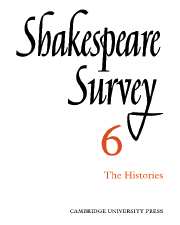Book contents
- Frontmatter
- Shakespeare's History plays: 1900-1951
- The Unity of 2 Henry IV
- Anticipation and Foreboding in Shakespeare’s Early Histories
- Middle-Class Attitudes in Shakespeare’s Histories
- A Reconsideration of Edward III
- On Producing Henry VI
- The Huntington Library
- An Early Elizabethan Playhouse
- Shakespeare Learns the Value of Money: The Dramatist at Work on Timon of Athens
- Shakespeare’s French Fruits
- An Elizabethan Eyewitness of Antony and Cleopatra?
- Othello’s “It is the cause . . .”: An Analysis
- On Translating Hamlet
- Shakespeare in China
- International Notes
- Shakespeare Productions in the United Kingdom: 1951
- Shakespeare’s History Plays - Epic or Drama?
- Festival Shakespeare in the West End
- The Year's Contributions to Shakespearian Study 1 Critical Studies
- 2 Shakespeare’s Life, Times and Stage
- 3 Textual Studies
- Books Received
- Index
- Plate Section
Middle-Class Attitudes in Shakespeare’s Histories
Published online by Cambridge University Press: 28 March 2007
- Frontmatter
- Shakespeare's History plays: 1900-1951
- The Unity of 2 Henry IV
- Anticipation and Foreboding in Shakespeare’s Early Histories
- Middle-Class Attitudes in Shakespeare’s Histories
- A Reconsideration of Edward III
- On Producing Henry VI
- The Huntington Library
- An Early Elizabethan Playhouse
- Shakespeare Learns the Value of Money: The Dramatist at Work on Timon of Athens
- Shakespeare’s French Fruits
- An Elizabethan Eyewitness of Antony and Cleopatra?
- Othello’s “It is the cause . . .”: An Analysis
- On Translating Hamlet
- Shakespeare in China
- International Notes
- Shakespeare Productions in the United Kingdom: 1951
- Shakespeare’s History Plays - Epic or Drama?
- Festival Shakespeare in the West End
- The Year's Contributions to Shakespearian Study 1 Critical Studies
- 2 Shakespeare’s Life, Times and Stage
- 3 Textual Studies
- Books Received
- Index
- Plate Section
Summary
Shakespeare’s attitude to history has been dealt with exhaustively by E. M. W. Tillyard in his Shakespeare’s History Plays. He has shown that Shakespeare’s basic conception of history corresponds with that of the Tudor historians, who themselves followed medieval ideas. The Universe was considered to be a unity, in which everything had its definite place, and it was the perfect work of God. Since any imperfection was regarded as the work not of God, but of man, the varied history of the civil wars appeared as evils caused by human sinfulness. Mortal sins, such as murder, worldly ambition, revenge, were the cause of the disorder. Henry VII favoured such ideas in official historiography, for he could use them for supporting his title to the crown: by uniting the claims of the two houses of York and Lancaster his ascent to the throne brought the disastrous rivalry to an end. This ‘official’ outlook was entirely different from that of later Renaissance authors. Machiavelli, for example, looked upon the natural state of man as disorder which only a clever ruler could restrain by using his wit and power.
- Type
- Chapter
- Information
- Shakespeare Survey , pp. 36 - 38Publisher: Cambridge University PressPrint publication year: 1953

